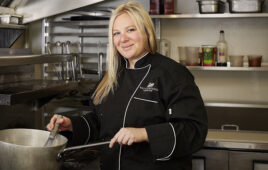
Balance is a strong and powerful word in our industry. The first thought that pops into my mind as a chef when I think of balance is the delicate art of balancing flavors and textures to create the perfect combination. Some adjectives that jump into my head when we talk about balance are sweet, salty, sour, spicy, bitter, crunchy, creamy, chewy, and crisp, and those are just the balance of flavors. We now need to think about the balance in the visual and presentation side of the dish in terms of height and color. Then there are also issues to consider, like being allergy sensitive, vegan, gluten-, soy-, and shellfish-free.
As the bigger picture of balance on our menu comes into focus, we have to ask the next set of questions: Are costs in balance, and can our club and department be profitable?
There are many things to balance in a single menu item or nightly special. Most of these decisions we make instantaneously. The years of training and dedication it took to reach these positions and perfect our pallet have been daunting. Most of us could talk for hours upon hours about these important aspects of our culinary life.
However, that is not the balance I am talking about. We know as chefs that these are the things we must focus on. Instead, I want to ask you these questions: What was your child’s last play about? Were you there for kindergarten graduation or did you miss it because it was on a Saturday? When was the last time you took your significant other out on a date? Do you get to kiss your kids goodnight or read them a story before bed? Are you sitting in a recital worrying about what is going on at work?
How you answered those questions depends on if you have a work-life balance.
Like many chefs or industry professionals, I have not always made work-life balance a priority in my life. Early in my career, work came first. Period. Always. I was becoming the chef I need to be. Being there to open, making sure my crew knew that I could close, and not being above cleaning all this time helped ensure my team would work harder for me. They knew that I work hard for them as well.
My family knew how much I loved them. They understood that I would work hard for many long hours so they could have a better life. This is who I am. I always tried to spend as much time as possible with them on my day off, but, I admit, I would often be so tired that nap time crept into my family time. I needed time to myself to unwind as well.
But one day a funny thing happened, and a light bulb went off. The club was here before me, and the club will be here after me. The people that matter the most in this world are family. What a revelation and earth-shattering idea.
The tough question is, how do we chefs put that into practice? I decided to be home at night before bedtime to say goodnight. To be present at home and not let my mind wander to the kitchen of unfinished tasks. I had to train staff and hold them accountable to my standards, delegate areas of responsibility, and inspect what I expect. None of this was easy to accomplish, but it was worth it in the end. I developed trust with the staff knowing they could handle their jobs and earned new respect, giving them the freedom to do their jobs.
That being said, I am still a workaholic. The difference is that I don’t make working THE priority. When I am not needed, I go home. I did have some upfront and honest conversations with my GM before I was hired that a work-life balance is important to me. Thankfully, the team at Superstition Mountain Golf and Country Club is fully supportive.
I choose to work less during the slower periods at the club after working nonstop during the busy season. I don’t mind working a 75-hour work week when needed, but I no longer feel obligated to do this year-round. I can trust my team and take some time to focus on my family and myself.
This generation works to live—not the other way around. We still need to instill in aspiring chefs that we were not born chefs. We had to sweat, cry, bleed, and sacrifice to get where we are now in our careers. The balance we are now striving for comes at the end of a long line of dedication and commitment to our craft.
In the end, I suggest ensuring your priorities are in line, finding people you trust to work alongside you and try not to miss what is really important in life.



